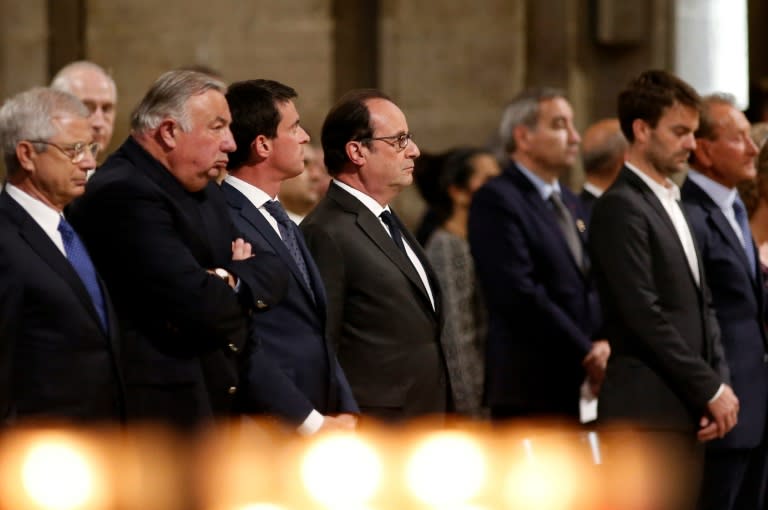French church attackers pledged allegiance to IS: what we know
Two jihadists who attacked a French church and brutally murdered a priest had pledged allegiance to the Islamic State group, a video showed Wednesday. The attack in the Normandy town of Saint-Etienne-du-Rouvray came as France was still coming to terms with the Bastille Day killings in Nice claimed by IS. Here is what we know so far about the church attack: - What happened? - Two men arrived at the 17th century Eglise Saint-Etienne during morning mass, attacking the church and taking five hostages inside. During the siege they killed a priest in his 80s by slitting his throat and seriously injured another captive. The victim was father Jacques Hamel, a semi-retired assistant parish priest, according to the archbishop of nearby Rouen, Dominique Lebrun. Hamel was born in 1930 in Darnetal, a town near Saint-Etienne du Rouvray, and was ordained in 1958, according to information on the diocesan website. This is the first jihadist attack on a church on French soil since IS carried out its first attacks in Syria's war in 2013. Some 65 percent of France's population identify as Catholics, according to the Ifop polling centre. The country's second-largest religion, Islam, has five million followers. - Taken down by police - As the two attackers made to leave the church they were confronted by a French police unit specialising in hostage situations, the BRI, and were shot dead. Three of the hostages were freed unharmed. The scene was then secured by officers from France's elite RAID unit, who scoured the area for explosive devices. None were found. - Who were the attackers? - One of the attackers has been identified as French jihadist Adel Kermiche, 19, who was awaiting trial on terror charges and had been fitted with an electronic tag despite calls from the prosecutor for him not to be released. Sources close to the investigation said they found an identity card belonging to one Abdel Malik P., also 19, at Kermiche's home, who they believe is the second attacker. They said Abdel Malik "strongly resembles" a man hunted by anti-terrorism police in the days before the attack over fears he was about to carry out an act of terror. In a video posted on the IS news agency Amaq, two bearded men, calling themselves by the noms de guerre Abu Omar and Abu Jalil al-Hanafi, hold hands as they swear "obedience" to IS leader Abu Bakr al-Baghdadi. On Tuesday, IS said the two assailants were its "soldiers" and the attack retribution for France's fight against the jihadists in the Middle East. Kermiche, who was known to France's anti-terrorism police, tried twice to go to Syria in 2015. He had already threatened to attack a church, according to witness testimony collected in his neighbourhood. "We knew he wanted to go to Syria," a 60-year-old neighbour of the assailant's family, who added that he "never saw him go to the mosque". - Deadly summer surge - President Francois Hollande, members of his government and opposition rivals gathered together on Wednesday at the symbolic Notre-Dame cathedral in Paris for a mass attended by Muslim, Jewish and Christian leaders to pay tribute to the murdered priest. The moving gathering provided a rare show of unity and respite from days of political sniping over the repeat attacks, which right-wing parties say are due to the Socialist government's failure to protect citizens. Prime Minister Manuel Valls has warned that the goal of the attack, claimed by Islamic State jihadists, was to "set the French people against each other, attack religion in order to start a war of religions". France remains on high alert after Mohamed Lahouaiej Bouhlel ploughed a truck into a crowd of people celebrating Bastille Day in Nice, killing 84 people and injuring over 300. The July 14 killings was the third major terror attack in France in little more than 18 months.




